Class X - Chapter -9 " Bholi" by by K.A. Abbas ( Book - Footprints Without Feet )
Footprints Without Feet book
Chapter 9 Bholi
by K.A. Abbas
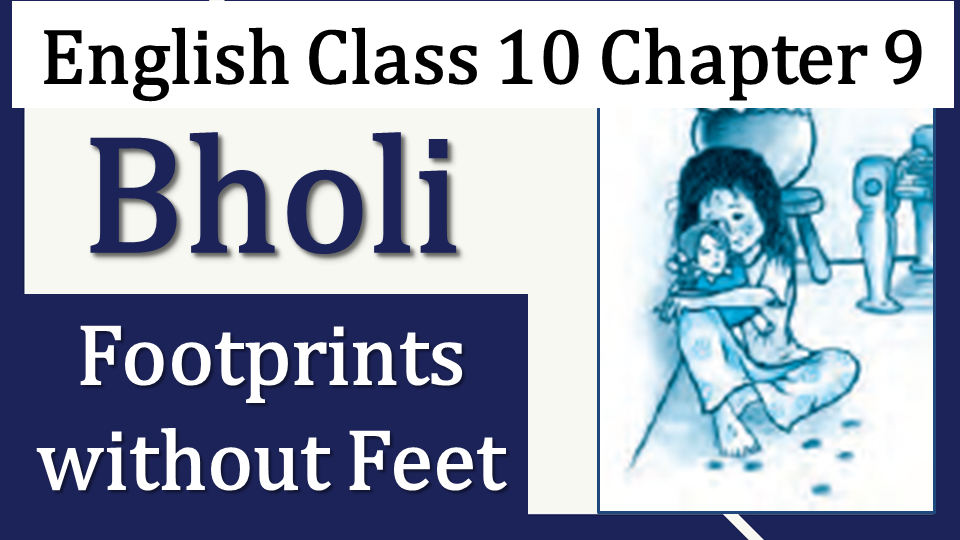
Introduction to the lesson
Bholi is a story written by K.A. Abbas. The story revolves around a girl who due to accidental fall and disease in her childhood faces the problem of being dull and ugly. She is always a target by everyone for not being good looking and intelligent. Her life turns when she joins a nearby school where her teacher encourages her and helps her to become a learned and confident person. Later in the story, circumstances arise where Bholi has to give acceptance to the marriage with an unequal match but rejects it when she sees her father pleading to the bridegroom when he demands dowry. The story shows the rise of a girl against social injustice.
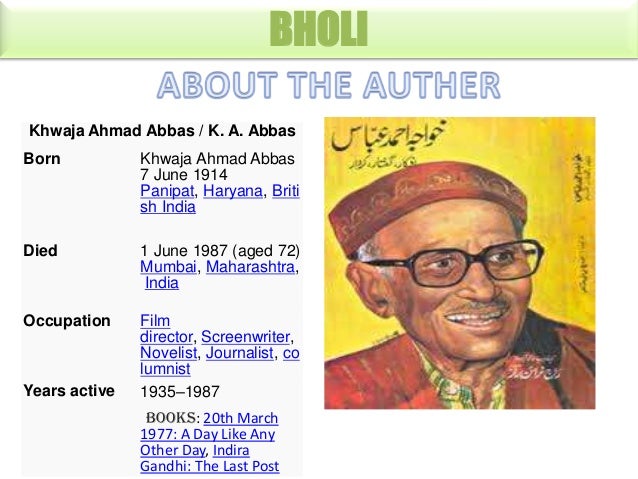
Summary of the story
The story opens up with the introduction of a little girl named Sulekha. She was called ‘Bholi’ for being a simpleton. This was so because some part of her brain had got damaged due to an injury during her childhood. She stammered and had pockmarks on her face which she got when she had contracted smallpox at the age of two. She was a laughing stock for everyone. Her father Ramlal was a Numberdar. He had three sons and four daughters, Bholi being the youngest of all. Ramlal was always worried about her as it seemed impossible to marry her with her having an ugly face and a dumb mind. One day, the Tehsildar visited their village to inagurate a girl’s primary school. He persuaded Ramlal to send his daughters to school. Ramlal’s wife suggested to send Bholi to school, although she was against sending girls to school because no boy would marry such a girl. She reasoned that as Bholi had no chance of getting married, so she could go to school. In the beginning, Bholi was frightened to leave her house but when for the first time in her life, she was dressed up and her hair was washed and oiled, she felt that she was to visit a better place. In the school, she met a teacher who was very kind and polite to her. She encouraged her to study and speak with confidence. This filled hope in Bholi and she began to go to school every day. Years passed and her village upgraded into a small town with some facilities like a cotton mill, a cinema and the primary school being converted into a secondary school. One day Bholi’s parents decided to marry her to a lame old man who was a widower but was rich and had not demanded any dowry. They thought it to be the best marriage proposal for their dumb daughter and fixed up her marriage. On the wedding day, the bridegroom arrived with great pomp and show which filled Ramlal with joy. The groom discovered that Bholi had pock marks and demanded dowry in return for marrying her. He demanded a sum of five thousand rupees. Ramlal begged for mercy and even placed his turban in Bishamber’s feet but Bishamber Nath did not agree. Ramlal had to give the money in order to save both his family’s honour and his daughter’s marriage. Bholi could not bear all this and refused to marry a greedy old man. People accused her of being shameless. The wedding party returned. The marriage ceremony ended without Bholi getting married. Her father was surrounded by grief and said that now no one would marry her and what would she do in future. To this, she replied that she would take care of her parents when they grew old and would teach in her school. Her teacher who was quietly watching all this felt proud of her decision.
Bholi -Text and word meaning
HER name was Sulekha, but since her childhood everyone had been calling her Bholi, the simpleton. She was the fourth daughter of Numberdar Ramlal. When she was ten months old, she had fallen off the cot on her head and perhaps it had damaged some part of her brain. That was why she remained a backward child and came to be known as Bholi, the simpleton.
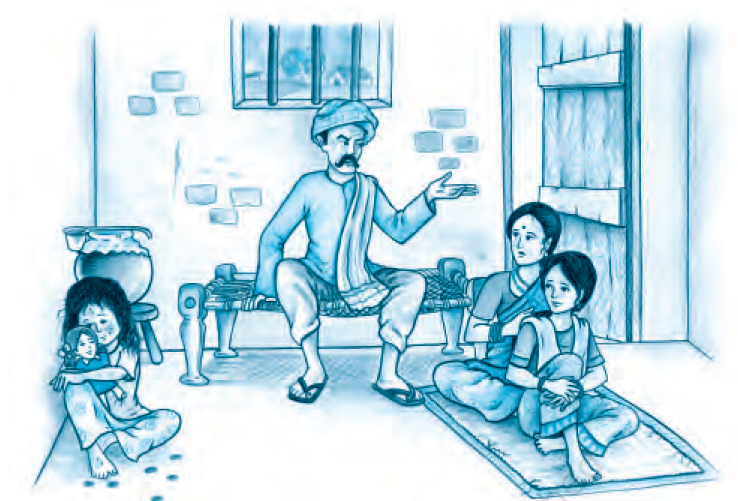
At birth, the child was very fair and pretty. But when she was two years old, she had an attack of small-pox. Only the eyes were saved, but the entire body was permanently disfigured by deep black pockmarks. Little Sulekha could not speak till she was five, and when at last she learnt to speak, she stammered. The other children often made fun of her and mimicked her. As a result, she talked very little.
Ramlal had seven children — three sons and four daughters, and the youngest of them was Bholi. It was a prosperous farmer’s household and there was plenty to eat and drink. All the children except Bholi were healthy and strong. The sons had been sent to the city to study in schools and later in colleges. Of the daughters, Radha, the eldest, had already been married. The second daughter Mangla’s marriage had also been settled, and when that was done, Ramlal would think of the third, Champa. They were good-looking, healthy girls, and it was not difficult to find bridegrooms for them. But Ramlal was worried about Bholi. She had neither good looks nor intelligence.
Consulted: discussed
The next day Ramlal caught Bholi by the hand and said, “Come with me. I will take you to school.” Bholi was frightened. She did not know what a school was like. She remembered how a few days ago their old cow, Lakshmi, had been turned out of the house and sold. “N-n-n-n NO, no-no-no,” she shouted in terror and pulled her hand away from her father’s grip.
“What’s the matter with you, you fool?” shouted Ramlal. “I am only taking you to school.” Then he told his wife, “Let her wear some decent clothes today, or else what will the teachers and the other schoolgirls think of us when they see her?” New clothes had never been made for Bholi. The old dresses of her sisters were passed on to her. No one cared to mend or wash her clothes. But today she was lucky to receive a clean dress which had shrunk after many washings and no longer fitted Champa. She was even bathed and oil was rubbed into her dry and matted hair. Only then did she begin to believe that she was being taken to a place better than her home !
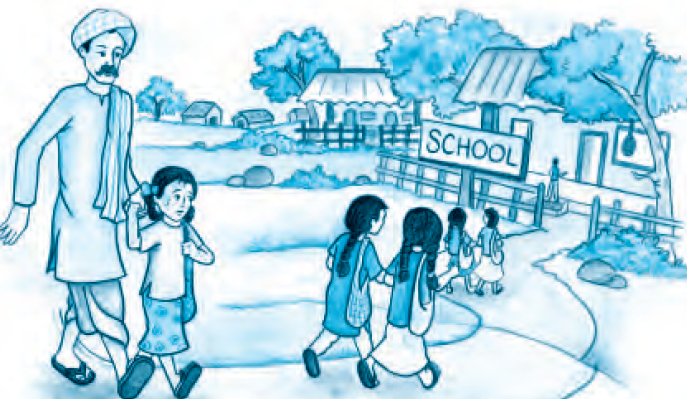
When they reached the school, the children were already in their classrooms. Ramlal handed over his daughter to the headmistress. Left alone, the poor girl looked about her with fear-laden eyes. There were several rooms, and in each room girls like her squatted on mats, reading from books or writing on slates. The headmistress asked Bholi to sit down in a corner in one of the classrooms.
The lady teacher who was in the class was saying something to the girls but Bholi could understand nothing. She looked at the pictures on the wall. The colours fascinated her — the horse was brown just like the horse on which the Tehsildar had come to visit their village; the goat was black like the goat of their neighbour; the parrot was green like the parrots she had seen in the mango orchard; and the cow was just like their Lakshmi. And suddenly Bholi noticed that the teacher was standing by her side, smiling at her. “What’s your name, little one?”
When the school bell rang, all the girls scurried out of the classroom, but Bholi dared not leave her corner. Her head still lowered, she kept on sobbing. “Bholi.” The teacher’s voice was so soft and soothing! In all her life she had never been called like that. It touched her heart.
Bholi felt as if suddenly all the bells in the village temple were ringing and the trees in front of the school-house had blossomed into big red flowers. Her heart was throbbing with a new hope and a new life. Thus the years passed. The village became a small town. The little primary school became a high school. There were now a cinema under a tin shed and a cotton ginning mill. The mail train began to stop at their railway station.
One night, after dinner, Ramlal said to his wife, “Then, shall I accept Bishamber’s proposal?”
“So what does it matter?” his wife replied. “Forty-five or fifty — it is no great age for a man. We are lucky that he is from another village and does not know about her pock-marks and her lack of sense. If we don’t accept this proposal, she may remain unmarried all her life.”
“Yes, but I wonder what Bholi will say.”
“What will that witless one say? She is like a dumb cow.” “May be you are right,” muttered Ramlal. In the other corner of the courtyard, Bholi lay awake on her cot, listening to her parents’ whispered conversation.
Grocer: a person who sells house hold goods and food items
When the auspicious moment came the priest said, “Bring the bride.”
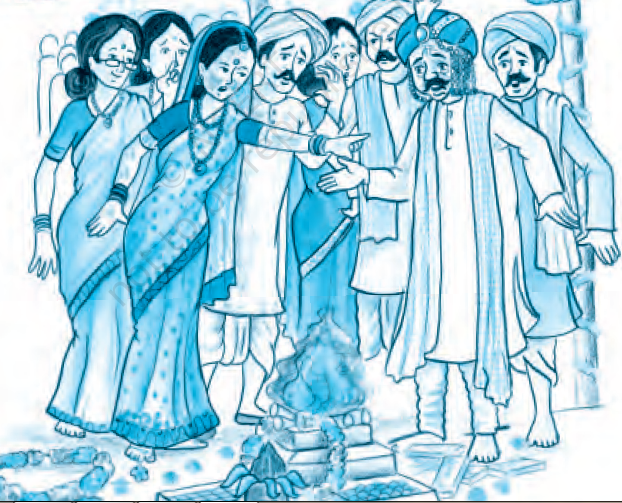
Once again the veil was slipped back from the bride’s face, but this time her eyes were not downcast. She was looking up, looking straight at her prospective husband, and in her eyes there was neither anger nor hate, only cold contempt. Bishamber raised the garland to place it round the bride’s neck; but before he could do so,
Bholi’s hand struck out like a streak of lightning and the garland was flung into the fire. She got up and threw away the veil.
“For the sake of your izzat,” said Bholi, “I was willing to marry this lame old man. But I will not have such a mean, greedy and contemptible coward as my husband. I won’t, I won’t, I won’t.”
“What a shameless girl! We all thought she was a harmless dumb cow.” Bholi turned violently on the old woman, “Yes, Aunty, you are right. You all thought I was a dumb–driven cow. That’s why you wanted to hand me over to this heartless creature. But now the dumb cow, the stammering fool, is speaking. Do you want to hear more?” Bishamber Nath, the grocer, started to go back with his party. The confused bandsmen thought this was the end of the ceremony and struck up a closing song.
Ramlal stood rooted to the ground, his head bowed low with the weight of grief and shame.
The flames of the sacred fire slowly died down. Everyone was gone. Ramlal turned to Bholi and said, “But what about you, no one will ever marry you now. What shall we do with you?”
And Sulekha said in a voice that was calm and steady, “Don’t you worry, Pitaji! In your old age I will serve you and Mother and I will teach in the same school where I learnt so much. Isn’t that right, Ma’am?”
The teacher had all along stood in a corner, watching the drama. “Yes, Bholi, of course,” she replied. And in her smiling eyes was the light of a deep satisfaction that an artist feels when contemplating the completion of her masterpiece.
Question and Answers
Q1- Bholi had many apprehensions about going to school. What made her feel that she was going to a better place than her home?
Ans- In the beginning, Bholi was scared of the idea of going to school. She was reminded of their cow Lakshmi who had been turned out of the house and sold off. It was when for the first time in her life that she was bathed, her hair washed and oiled and was dressed in clean clothes, that she felt that she was going to some better place than her home. She had never received such attention and care before.
Q2- How did Bholi’s teacher play an important role in changing the course of her life?
Ans- Bholi was always laughed at by everyone. People used to call her dumb and laughed at her when she would fumble while speaking. This made her sad and a low confident child who would remain quiet and sit with her head bent down into her knees. It was on the first day of her school that her teacher discovered her problem of being low confident due to her inability to speak clearly. She encouraged Bholi and treated her in a polite manner. Bholi was never treated like this by anyone. Her teacher told her that with practice she could become a learned person who could speak properly without stammering. This filled her with hope and led to a change in the course of her life.
Q3- Why did Bholi at first agree to an unequal match? Why did she later reject the marriage? What does this tell us about her?
Ans- Bholi agreed to marry an unequal match because she had heard her parents discussing the marriage proposal. They said that she was lucky to get a bridegroom who was rich and was ready to marry her without taking dowry. He was unaware of Bholi’s pockmarks and dumbness. She had heard her mother say that if they did not accept the proposal, Bholi might remain unmarried all her life. Later, Bholi refused from the marriage because the bridegroom demanded five thousand rupees as dowry from her father. Moreover, it was unbearable for her to see her father pleading in front of him for the sake of his daughter and family’s honour. Her self respect made her refuse from marrying a greedy coward.
Q4- Bholi’s real name is Sulekha. We are told this right at the beginning. But only in the last but one paragraph of the story is Bholi called Sulekha again. Why do you think she is called Sulekha at that point in the story?
Ans- The word “Bholi” means simpleton. On the other hand, the word Sulekha means a person with good handwriting. Throughout the story Bholi was sketched as a person who was a simpleton and never raised her voice for her betterment. At the end of the story she raised her voice for her self- respect and for her father’s dignity and refused to marry a greedy old man. The word Sulekha is used in the end to show her confidence, knowledge and ability to speak up against the injustice.
Extra Questions from the text


Comments
Post a Comment